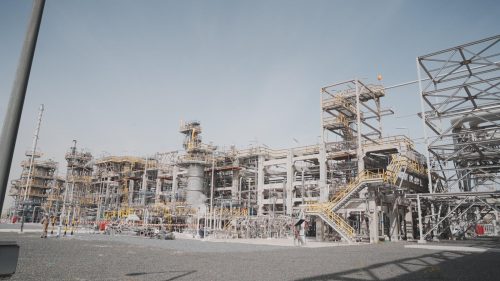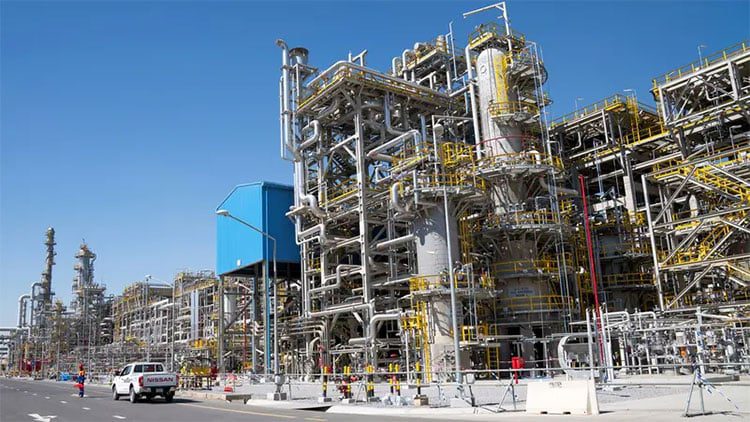Today, Tuesday, March 7 (2023), Kuwait started operating the second phase of the Al-Zour refinery, raising its production capacity to 410,000 barrels.
The CEO of the Kuwait Integrated Petroleum Industries Company (KIPIC), Walid Al-Badr, said that the refinery is one of the most important strategic national projects for the State of Kuwait.
Kuwait is counting on the Al-Zour refinery, which began its commercial operations in November 2022, by increasing its exports of oil derivatives, amid expectations that it will record a large leap during 2023, after operating the second phase, and proceeding to complete the project in full before the end of this year.
An achievement for the Kuwaiti oil industry
Al-Badr said that the operation of the second phase of the Al-Zour refinery coincides with the national holidays of the State of Kuwait, and a few months after the start of the commercial operation of the first phase.
He pointed out that it is a historic event and a remarkable achievement, not only in the history of Quebec, but in the history of the Kuwaiti oil industry.
It is expected that the third and final distillation unit in the project will start commercial operations in the middle of the last quarter of 2023, which will increase the refining capacity in Kuwait from about 800 thousand barrels per day, to 1.415 million barrels per day.
The Al-Zour refinery, when it reaches full capacity, will increase the global supply of low sulfur fuel oil by between 10 million and 12 million tons annually.
When operating at full capacity, the refinery will produce about 185,000 barrels per day of fuel oil, 106,000 barrels per day of jet fuel, 36,000 barrels per day of naphtha, and about 225,000 barrels per day of low-sulfur fuel oil, according to market sources.
The importance of the Al-Zour refinery project
Al-Badr pointed out the importance of the Al-Zour refinery project due to the large economic dimensions that are expected to be achieved after its operation, and its role in providing new job opportunities for Kuwaiti youth and securing promising markets for Kuwaiti oil products in the global markets.
He pointed out that the refinery works to provide stable, stable and safe supplies of oil products with low sulfur content and to achieve a strategic goal for the State of Kuwait to improve air quality.
He explained that with the launch of the second refinery, the refining capacity increased from 205,000 barrels to 410,000 barrels per day, after which the final stage would start operating the third refinery to reach the maximum targeted refining capacity, which reaches a maximum of 615,000 barrels per day when refining Kuwaiti light export crude to 535 thousand barrels per day for a mixture heavier than oil.
It is noteworthy that the commercial operations of the Al-Zour refinery began at the end of 2022, when the Kuwait Petroleum Corporation offered a shipment of naphtha to be loaded in November.
Since then, the refinery has offered and sold multiple cargoes of low sulfur diesel, low sulfur fuel oil and jet fuel cargoes.
Kuwait strategy
Al-Badr stressed that the Al-Zour refinery is one of the most important pillars of KPC’s strategy for the year 2040, given the significant and pivotal role assigned to it in shaping the future of the Kuwaiti oil industry by promoting the country’s exports of high-quality oil derivatives that conform to future specifications in global markets.

He pointed out that the operation of the Al-Zour refinery would raise the financial revenues of the state and support the power plants by providing them with stable, stable and environmentally safe supplies, currently estimated at 150,000 barrels of fuel with low sulfur content, divided among the two refineries. To meet the increasing demand for electric power as a result of population and urban growth, aiming to achieve internal self-sufficiency.
Al-Badr confirmed that there are external roles for the Al-Zour refinery, by providing other refining products for export in global markets, with standard specifications, in order to meet commercial operation, and keep pace with global demand.
The company established the largest artificial island in the middle of the sea, which is used to export liquid oil derivatives through two loading platforms with 4 berths and a central platform for exporting liquid products through the island through 4 pipelines under the sea.
He pointed to the importance of commitment to health, safety and the environment, which is one of the basic pillars that the company seeks to apply at all times, in accordance with the highest standards, stressing KIPIC’s endeavor to instill the concept of full compliance with the concepts of health, safety and the environment to be a practical lifestyle for all its employees and contractors.
The project faced several challenges, ranging from technical and logistical problems with contractors, to the Corona crisis, as Kuwait aimed to start operating the Al-Zour refinery in mid-2019 and fully operate it by 2020.
related topics..
Also read..

Leave a Reply